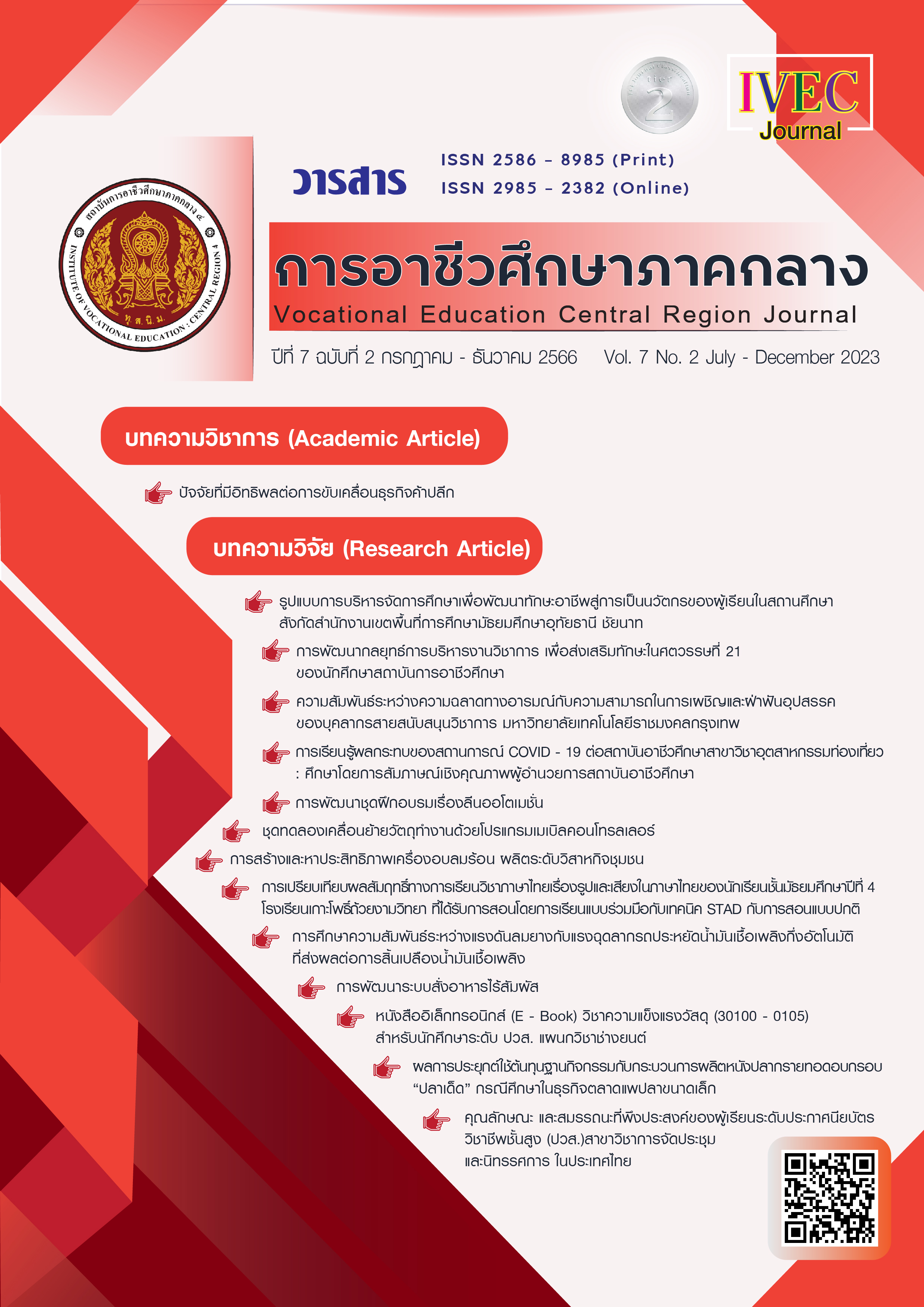Desired Characteristics and Desirable Competencies of Learners in the Diploma Vocational Certificate Program in Conference and Exhibition Management in Thailand
Main Article Content
Abstract
The study emphasizes the desired characteristics and competencies of diploma certification learners invocational schools in the Conference and Exhibition Management program in Thailand. The research is qualitative research using a phenomenological methodology. The researchers use in-depth interviews with semi-structured questions together with non-participant observation with 10 key informants. The research objectives are to examine the job positions and competency of vocational education learners and examine the guidelines for developing the competencies of the MICE curriculum on the higher vocational certificate level that are essential to MICE entrepreneurs. The study results entrepreneurs have expectations regarding specifically MICE professional knowledge, international language skills especially English communication skills, and the entire supply chain of MICE industry. In addition, the desired characteristics of students that entrepreneurs request are having a good attitude towards work, having a passion for providing service actively, understanding the correct profession, being able to work under pressure, being able to solve problems, paying attention to detail, teamwork and adaptive to change job requirements.
Article Details

This work is licensed under a Creative Commons Attribution-NonCommercial-NoDerivatives 4.0 International License.
|
บทความ ข้อมูล เนื้อหา รูปภาพ ฯลฯ ที่ได้รับการตีพิมพ์ในวารสาร การอาชีวศึกษาภาคกลาง ถือเป็นลิขสิทธิ์ของวารสารการอาชีวศึกษาภาคกลางหากบุคคลหรือหน่วยงานใดต้องการนำทั้งหมดหรือส่วนใดส่วนหนึ่ง ไปเผยแพร่ต่อหรือเพื่อกระทำการใด ๆ กองบรรณาธิการไม่สงวนสิทธิ์ ในการคัดลอกบทความเพื่อการศึกษาแต่ให้อ้างอิงแหล่งที่มาให้ครบถ้วน สมบูรณ์ สงวนสิทธิ์ โดย สถาบันการอาชีวศึกษาภาคกลาง 4 ที่ตั้ง 90 ถนนเทศา ตำบลพระปฐมเจดีย์ อำเภอเมือง จังหวัดนครปฐม โทรศัพท์ 034 242 856 , โทรสาร 034 242 858 ISSN : 3056-9176 (print) ISSN : 2985-2382 (online) |
References
กองทุนส่งเสริมการจัดประชุมนานาชาติ. (2557). คู่มือมาตรฐานการปฏิบัติงาน ผู้ประสานงานและผู้ วางแผนปฏิบัติการไมซ์ (ไทย). ปทุมธานี: มหาวิทยาลัยรังสิต.
กีรติ ยศยิ่งยง. (2549). ขีดความสามารถ Competency based approach. กรุงเทพฯ : สมาคมส่งเสริมเทคโนโลยี.
เกรียงศักดิ์ เจริญวงศ์ศักดิ์. (2559 , มกราคม-มิถุนายน). ถอดรหัสแนวโน้มใหญ่ของโลกปี 2020: โอกาสและการปรับตัวของธุรกิจในอนาคต. Journal of Management Sciences Suratthani Rajabhat University, 3, (1), น. 1 - 26.
ชาย โพธิสิตา. (2562). ศาสตร์และศิลป์การวิจัยเชิงคุณภาพ (พิมพ์ครั้งที่ 8). กรุงเทพฯ: อมรินทร์พริ้นติ้ง แอนด์ พับลิชชิ่ง.
ณรงค์วิทย์ แสนทอง. (2547). มารู้จัก Competency กันเถอะ. กรุงเทพฯ: เอช อาร์ เซ็นเตอร์.
ดุจเดือน พิงคยางกูล. (2555). การพัฒนาบุคลากรตามกรอบสมรรถนะหลักของศูนย์อนามัยที่ 10 เชียงใหม่. การค้นคว้าอิสระ ปริญญารัฐประศาสนศาสตรมหาบัณฑิต บัณฑิตวิทยาลัย มหาวิทยาลัยเชียงใหม่.
ทวีศักดิ์ นพเกสร, ประเวศ วะสี, และศุภสิทธิ์ พรรรณนารุโณทัย. (2551). วิธีการวิจัยเชิงคุณภาพ เล่ม 1: คู่มือปฏิบัติการวิจัยประยุกต์ เพื่อพัฒนาคน องค์กร ชุมชน สังคม (พิมพ์ครั้งที่ 2). นครราชสีมา: ชมรมพยาบาลชุมชนแห่งประเทศไทย.
ธนพล รุ่งเรือง และโชคชัย สุเวชวัฒนกูล. (2558). สมรรถนะบุคลากรในอุตสาหกรรมไมซ์และความภักดีของผู้เข้าร่วมกิจกรรม. วารสารวิชาการการท่องเที่ยวไทยนานาชาติ, 11, (2), หน้า 116 - 147.
นิสดารก์ เวชยานนท์. (2549). Competency-based approach. กรุงเทพฯ: กราฟิโกซิสเต็มส์.
พงศธร ลิมปนเวทย์สกุล. (2559). การพัฒนาตัวบ่งชี้สมรรถนะหลักตามองค์ประกอบร่วมของคุณลักษณะแรงงานในห่วงโซ่อุปทานธุรกิจการจัดงานแสดงสินค้าและนิทรรศการ. วิทยานิพนธ์ ปริญญาปรัชญาดุษฎีบัณฑิต สาขาวิชาการจัดการ บัณฑิตวิทยาลัย มหาวิทยาลัยศิลปากร.
พยัต วุฒิรงค์. (2555). การจัดการนวัตกรรม: จากแนวคิดสู่การปฏิบัติที่เป็นเลิศ. กรุงเทพฯ: จุฬาลงกรณ์ มหาวิทยาลัย.
พันธุ์พรหม รังสิธารานนท์. (2558). การพัฒนาสมรรถนะพนักงานฝ่ายทรัพยากรมนุษย์ในบริษัทกลุ่มอุตสาหกรรมยานยนต์และชิ้นส่วน. วิทยานิพนธ์ ปริญญาปรัชญาดุษฎีบัณฑิต มหาวิทยาลัยรามคำแหง, กรุงเทพฯ.
เยาวลักษณ์ ชาวบ้านโพธิ์. (2560, มกราคม-มิถุนายน). ความสามารถด้านการแข่งขันในอุตสาหกรรมไมซ์ของประเทศไทย. วารสารการวิจัยการบริหารการพัฒนา, 7, (1), หน้า 56-65.
รัตนะ บัวสนธ์. (2551). การวิจัยเชิงคุณภาพทางการศึกษา. กรุงเทพฯ: คำสมัย.
สำนักงานส่งเสริมการจัดประชุมและนิทรรศการ (องค์การมหาชน). (2563). การประชุมองค์กร = Meetings 101. กรุงเทพฯ : สำนักงานส่งเสริมการจัดประชุมและนิทรรศการ (องค์การมหาชน).
อรรคพล สรสุชาติ. (2552). ยุทธศาสตร์การพัฒนาอุตสาหกรรมการจัดประชุม การท่องเที่ยวเพื่อเป็นรางวัล การจัดประชุมนานาชาติ และงานแสดงสินค้านานาชาติ (ไมซ์) ของประเทศไทยให้เป็นศูนย์กลางในภูมิภาคเอเชีย. กรุงเทพฯ: วิทยาลัยป้องกันราชอาณาจักร.
อุกฤษณ์ กาญจนเกตุ. (2543). การใช้ Competency ในการบริหารงานบุคคล. วารสารบริหารคน, 4, (21), หน้า 11 - 18.
Ahmad, J., & Daud, N. (2016). Determining Innovative Tourism Event Professional Competency for Conventions and Exhibitions Industry: A Preliminary Study. Procedia - Social and Behavioral Sciences, 219, pp. 69 - 75.
Boyatzis, R.E. (1982). The competent manager: A Model for effective performance. New York: John Wiley & Sons.
Huang, Y.L., & Lin, C.T. (2010). Management trainee core competencies in the hospitality industry: Differences between managers and scholars. Journal of Human Resources in Hospitality & Tourism, 10, (1), หน้า 1 - 13.
Jotikasthira, N. (2014). Increasing Tradeshow and Exhibition Industry Competitiveness Through Competency - Based Hiring and Promotion: A Sale Executive Perspective. International Journal of Business Tourism and Applied Sciences, 2, (1), pp. 45 - 60.
McClelland, D.C. (1970). The two faces of power. Journal of international affairs, 24, (1), หน้า 29 - 47.


